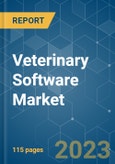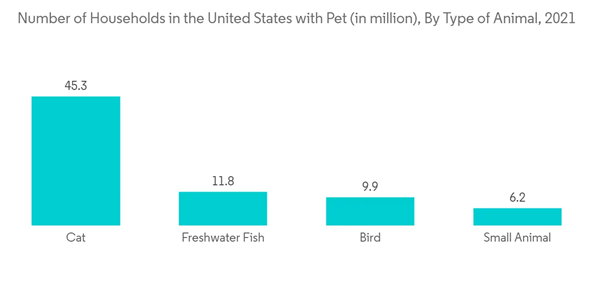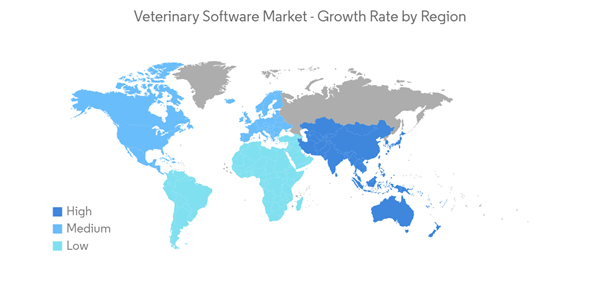The global outbreak of COVID-19 has impacted the veterinary software market. The COVID-19 pandemic caused drastic changes to people’s normal routines, with social distancing and lockdowns in place across the world. Thus, many people were suffering from the veterinary software market. The COVID-19 pandemic caused drastic changes to people's normal routines, with social distancing and lockdowns in place across the world. Thus, many people were suffering from loneliness, which had a negative impact on their mental health. Therefore, many people adopted companion animals during the lockdown period. For instance, according to the PDSA PAW report published in June 2021, 2.0 million people in the United Kingdom owned pets between March 2020 and May 2021. Therefore, owing to the high rate of adoption, the demand for veterinary software was quite high during the pandemic and is expected to maintain an upward trend over the forecast period.
The major factors propelling the growth of the market include product innovations, software integration, and increasing opportunities for practice management. For instance, as per the Veterinary Hospital Managers Association (VHMA) report published in 2021, in response to the increasing demand for pet care, the requirement for more advanced equipment, processes, and, most importantly, systems and software has also increased. The same source also stated that veterinarians have accepted and acknowledged the professional management of veterinary practices using more advanced and integrated software. Therefore, the interest of veterinarians in software management in veterinary healthcare is encouraging key players to introduce innovative product lines in the market. For instance, in October 2020, Airvet, one of the leading veterinary telemedicine and telehealth platforms, announced the closing of a USD 14.0 million Series A funding round led by Canvas Ventures and several major veterinary industry leaders. This will enable the company to meet the rapid increase in demand for its telemedicine platform for both veterinarians and pet parents. Similarly, in July 2020, Zoetis acquired the veterinary engagement software company Virtual Recall. With this, Zoetis will expand its comprehensive offering across the continuum of care for veterinary clinics and will enhance the level of pet owner services that can be offered to its pet owner customers in the United Kingdom, Australia, and New Zealand. Therefore, owing to such positive developments, it is anticipated that the market will witness considerable growth over the forecast period.
Furthermore, the increasing number of veterinarians and increased adoption of veterinary software by veterinarians are also positively impacting the market. For instance, as per the data published by the American Veterinary Medical Association in 2021, over 68,000 veterinarians in North America and around 22,000 in the United Kingdom were practicing privately. This number is further anticipated to increase over the forecast period. This increase is anticipated to fuel the demand for these solutions for managing operations in clinics and reference laboratories. Moreover, veterinary practice software has been experiencing rapid technological advancements in terms of integrating with diagnostic and laboratory equipment and streamlining data, lab results, and images directly into a patient’s medical record, which can be remotely shared with other veterinary practitioners for various purposes, such as consultations, dual treatments, and training. Thus, the increasing need for providing optimum care to animals through proper practice management is expected to drive market growth over the forecast period.
But the lack of government incentives to use software may slow the growth of the market over the next few years.
Veterinary Software Market Trends
Practice Management Software is Expected to Witness Considerable Growth Over the Forecast Period
Veterinary practice management software is a tool that helps with the day-to-day operations of a veterinary practice. Veterinarians use veterinary practice management software to manage patient information, treatment planning, and scheduling, as well as back-office functions such as accounting. This type of software helps veterinary clinics with patient diagnosis and treatment management and allows nurses or technicians to provide treatment efficiently. In addition, the administrative staff uses veterinary practice management software to manage patient communication, patient intake, and payments. More advanced veterinary practice management software is available for veterinary hospitals, while scaled-down versions can be used by small clinics or private practices.Veterinarians primarily use veterinary practice management software for managing patient information, treatment planning, and scheduling appointments. The most common features of the practice management software include after-care instructions for clients, client-patient databases, billing, boarding/grooming, capturing lost charges, client communications, client reminders, electronic medical records, electronic whiteboards, inventory control, and many others.
Certain strategic movements that are seen in the market may accelerate segment growth over the forecast period. For instance, in May 2022, Covetrus, a global leader in animal health technology and services, introduced Ascend, cloud-based practice management software (PMS) built to enable veterinary practices across the United Kingdom, EMEA, and Asia Pacific. The software improves efficiency, streamlines internal communication and collaboration, and creates a better experience for staff and clients. Similarly, in August 2020, Patterson Veterinary upgraded the NaVetor mobile app to simplify curbside and in-clinic patient care. These developments by the major players, such as strategic partnerships and the adoption of new technologies, are expected to boost segment growth over the forecast period.
North America is Expected to Witness Significant Growth Over the Forecast Period
North America is expected to dominate the overall veterinary software market over the forecast period. The major factors propelling market growth include the rising adoption of companion animals and increasing per capita animal healthcare expenditure. For instance, 67.0% of U.S. households, or about 85.0 million families, own a pet, according to the 2020-2021 National Pet Owners Survey conducted by the American Pet Products Association (APPA). Similarly, as per the data provided by the American Veterinary Medical Association, in March 2020, approximately USD 29.3 billion was spent in the country on veterinary care and services. Thus, with the increased awareness and expenditure regarding animal health and the high pet ownership rates, the market is expected to show significant growth over the forecast period in the North American region.Key product launches, a high concentration of market players or manufacturers' presence, acquisitions and partnerships among major players, and the increasing adoption of pets in the United States are some of the factors driving the growth of the veterinary software market in the country. For instance, according to the American Pet Products Association's 2021-2022 National Pet Owners Survey, around 69.0 million Americans own a dog, 45.3 million own cats, 11.8 million own freshwater fish, 9.9 million own birds, 6.2 million own small animals, 5.7 million own reptiles, 3.5 million own horses, and 2.9 million own saltwater fish. With the increased ownership of pets and livestock, United States citizens have also become more considerate toward the health of these animals. Similarly, in March 2020, Maryland-based VetBilling released a web-accessible, PCI-compliant platform that allows veterinarians to offer in-house payment plans with low financial risk.
Therefore, owing to the aforesaid factors, the growth of the studied market is anticipated in the North American region.
Veterinary Software Market Competitor Analysis
The veterinary software market is moderately competitive. Currently, the adoption of information systems in veterinary healthcare is allowing more companies to penetrate the market and gain profits. The competitive landscape includes an analysis of a few international as well as local companies that hold market shares and are well known, including 2i Nova, Animal Intelligence Software Inc., Business Infusions, and Carestream Health, among others.Additional benefits of purchasing the report:
- The market estimate (ME) sheet in Excel format
- 3 months of analyst support
This product will be delivered within 2 business days.
Table of Contents
Companies Mentioned (Partial List)
A selection of companies mentioned in this report includes, but is not limited to:
- 2i Nova
- Animal Intelligence Software Inc.
- Business Infusions
- Carestream Health
- Covetrus Inc.
- ezyVet
- FirmCloud Corp.
- IDEXX Laboratories Inc.
- Patterson Companies Inc.
- Vetter Software Inc.










